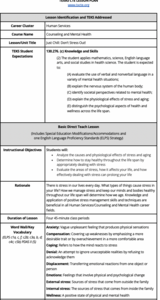Lee & Low Books
First Come the Zebra Teacher’s Guide
Accompany a reading of First Come the Zebra written and illustrated by Lynne Barasch with a teacher's guide equipped with before reading, vocabulary, and after reading activities. Additional social studies, science, music, art, math, and...
Franklin D. Roosevelt Presidential Library & Museum
Pearl Harbor Activity #5: The Medium Matters
Young journalists learn that how we get our news and information matters in a collaborative social studies activity. The class is divided into three groups with the first analyzing a transcript of FDR's "Day of Infamy" speech, the second...
Texas Education Agency (TEA)
Just Chill: Don’t Stress Out!
Billy Joel's song, "Pressure," opens a lesson that teaches some techniques to deal with pressure and stressors, significant factors that contribute to aging and poor health. Throughout the four-day lesson, participants study stress...
Council for Economic Education
Satisfaction Please! (Part 1)
The topic of consumerism seems easy to those who participate actively in the US economy, but pupils who are new to economics may see the idea as foreign. Help them understand their rights as consumers and what to expect when interacting...
Foreign Policy Association
U.S. and Europe Online Lesson Plan
Class groups investigate the economic and political implications of a country's policies on genetically modified foods, craft a position paper detailing that policy, and share their findings with the class. Armed with this information,...
National Endowment for the Humanities
The House Un-American Activities Committee
Was the House Un-American Activities Committee justified in investigating subversive influences in the entertainment industry? Part two of the three-part series of lessons that examine the anti-communism movement after World War II,...
Briscoe Center for American History
Mary Maverick and Texas History - Part 2
To conclude their investigation of the life of Mary Maverick and to demonstrate their ability to analyze primary source documents, groups use the SOAPS questioning method to examine Maverick's account of events in early Texas history.
Briscoe Center for American History
Mary Maverick and Texas History - Part 1
What's the difference between a diary and a memoir? Young historians explore the ramifications of this question as they learn how to use primary source materials to gain an understanding of life on the Texas frontier.
Briscoe Center for American History
Applying the SOAPS Method of Analyzing Historical Documents
Young historians use the SOAPS (Speaker, Occasion, Audience, Purpose, Subject) method of questioning to determine the historical value of primary source documents. The third in a series of five lessons that model for learners how...
Historical Thinking Matters
Spanish-American War: 1 Day Lesson
After analyzing newspaper articles portraying different perspectives of the explosion of the Battleship USS Maine, your young historians will take a stand on which position is the most believable in both discussion and writing.
Historical Thinking Matters
Spanish-American War: 3 Day Lesson
Why did the United States choose to invade Cuba in 1898? As part of a 3-day lesson, your young historians will first develop working hypotheses to answer this question, then work with a variety of historical primary source documents that...
Curated OER
John Smith’s Map of the Chesapeake Bay
Young geographers travel back through time with primary source and map analysis and envision Captain John Smith's arrival at the Chesapeake Bay.
Curated OER
The Chesapeake Bay in Captain John Smith's Time
When Captain John Smith visited the Chesapeake Bay in the summer of 1608, what types of animals and habitats did he encounter? Your young historians will analyze primary source documents to answer this question, as well as compare the...
Owl Teacher
Teach Ancient Rome!
Teaching the class about Ancient Rome can be fun for you and for them! Check out this incredible resource that has everything you need to bring ancient Roman civilization back to life. Begin by scrolling to the bottom of the page and...
Miami-Dade County Public Schools
Five Themes of Geography Packet
The five themes of geography are perfect for introducing learners to some of the ways that people interact with the world around them. This packet contains 20 full lessons, each focused on topics relating to the five themes of geography,...
Curated OER
Narrative of the Life of Frederick Douglass by Frederick Douglass
Imagine what it was like to be a slave in the United States in 1845. Eighth graders are given an opportunity to experience life from the point of view of Frederick Douglass as they read and discuss an annotated passage from Narrative of...
Project Tahoe
Individual Rights vs. The Greater Good Within the Scope of War
When, if ever, is the government justified in restricting individual rights? When, if ever, should the "greater good" trump individual rights? To prepare to discuss this hot-button topic, class members examine primary source documents,...
National Endowment for the Humanities
Martin Luther King, Jr. and Nonviolent Resistance
Was nonviolent resistance the best means of securing civil rights for black Americans in the 1960s? In this highly engaging and informative lesson, your young historians will closely analyze several key documents from the civil rights...
University of California
Roots of the Cold War
When and how did the Cold War begin? To answer this question, you will not find a better-organized, in-depth, activity- and inquiry-based resource than this! Executing best teaching practices throughout, each portion of this inquiry...
Close Up Foundation
Rights Auction
In an engaging activity on universal and unalienable rights, learners work in groups to establish a democratic nation and determine what principles they want to protect to ensure a democratic society. They conduct a "rights auction" in...
Carolina K-12
Comparing Economic Systems
How do people make decisions in a world where wants are unlimited but resources are not? How do individuals and governments utilize scarce resources (human, natural, and capital) in different economic systems? Introduce your learners to...
Roy Rosenzweig Center for History and New Media
Yankee Doodle: How Has It Changed over Time?
Grab your feathers and your hat! And perhaps some macaroni! It's time to investigate the evolution of "Yankee Doodle Dandy." Groups do a close reading of sheet music covers, lyrics, and even YouTube videos to see how this political song...
Roy Rosenzweig Center for History and New Media
The Boston Massacre: You Be the Judge!
The importance of considering multiple perspectives of the same event is the big idea in this exercise that focuses on the Boston Massacre. Class groups examine photos of four depictions of the massacre, an English and an American...
Roy Rosenzweig Center for History and New Media
Analyzing Political Campaign Commercials
Imagine a lesson that models for learners how to separate facts from opinions. How to detect bias. How to evaluate a source of information. How to identify propaganda. Although designed for middle schoolers, the activities in this packet...
Other popular searches
- Elementary Social Studies
- Middle School Social Studies
- Social Studies Lesson Plans
- Social Studies Lessons
- Social Studies Activities
- Esl Social Studies
- Social Studies Community
- Social Studies Art
- Social Studies Plan
- Social Studies Concepts
- Social Studies Economics
- Social Studies Map Skills

























